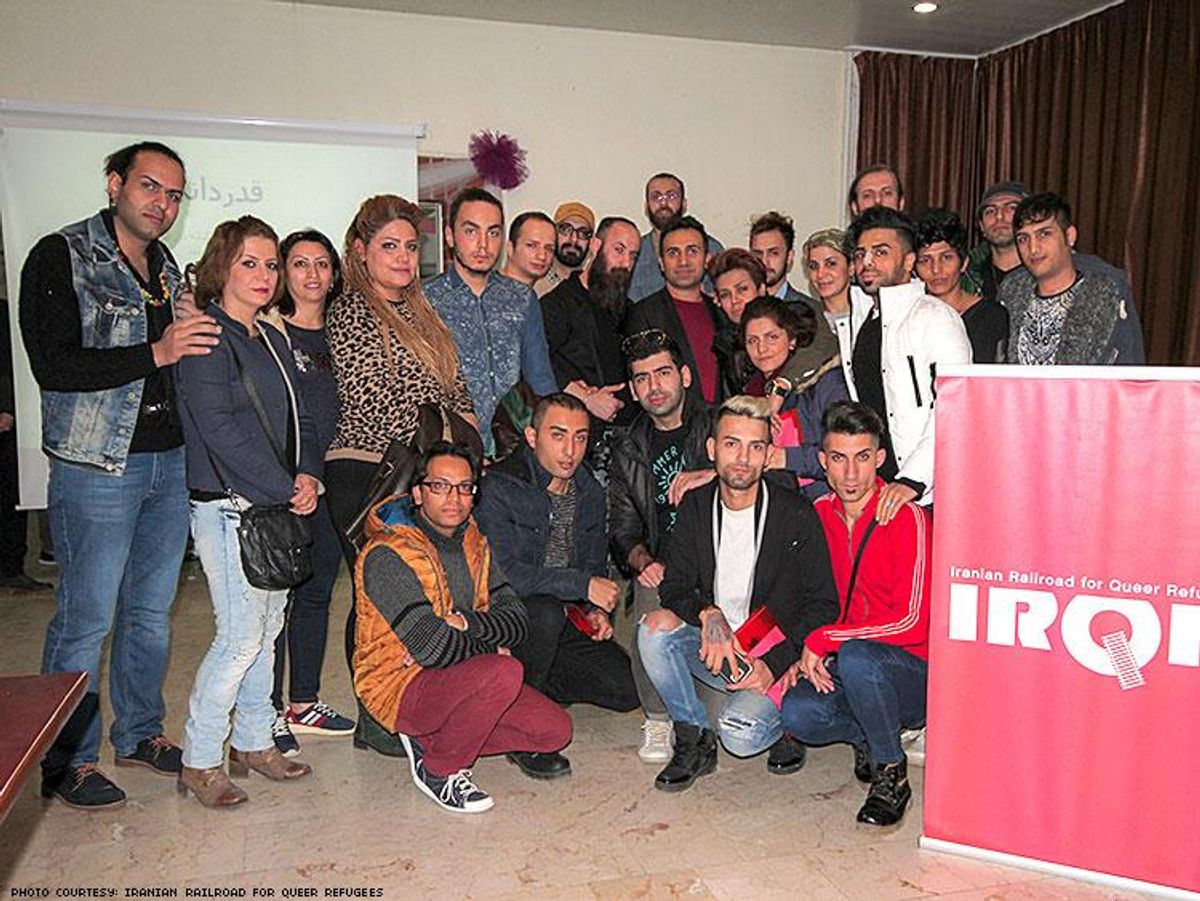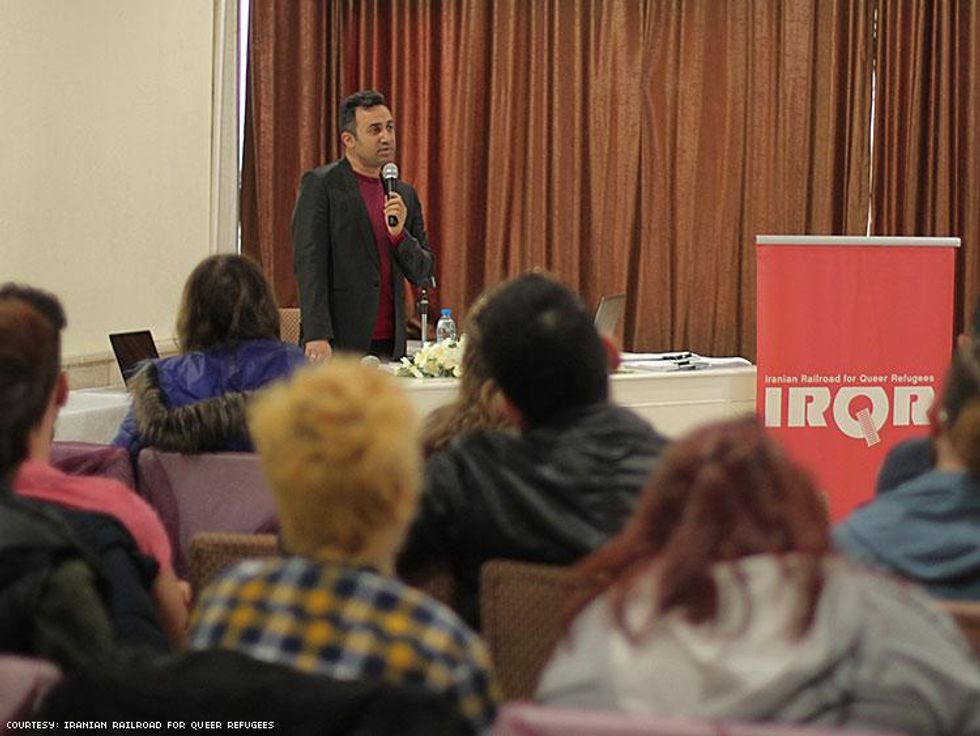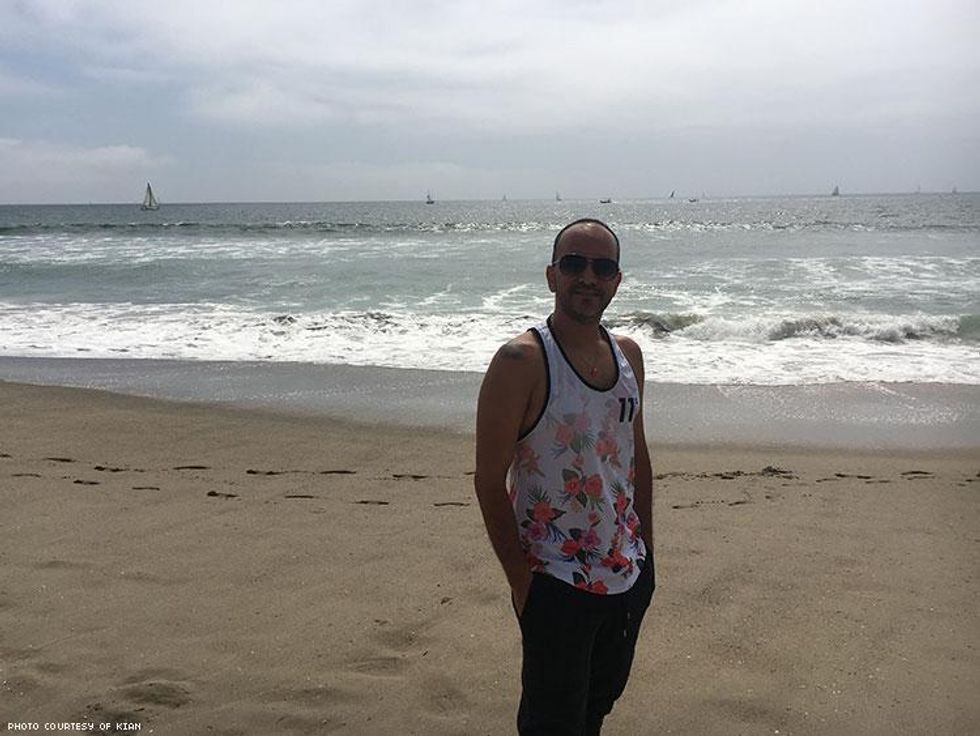Every morning in the southwestern Turkish city of Denizli, Shayan -- an LGBT refugee from Iran -- wakes up and goes to his computer. He types in his identifying case number and clicks "enter" on the International Organization for Migration website for Ankara to see if his travel date to the U.S. has been updated yet.
The date is always blank.
When President Trump signed an executive order January 27 freezing refugee resettlements for 120 days and decreasing the number of admitted refugees to the U.S. this year from 110,000 to 50,000, Shayan, 29, had been waiting for his plane ticket to the U.S. to arrive and for his visa to get approved.
In January the U.S. told the United Nations High Commission for Refugees and other groups that resettle LGBT refugees that it could take up to four months until the process started again. In March the U.S. government told them that it could take an additional four months. Shayan had already been accepted by the U.S. and even though the courts initially blocked both versions of the travel ban, the halt of Trump's orders didn't fix the backlog of cases. Now that the Supreme Court has reinstated part of Trump's ban on travelers from six Muslim-majority nations as well as refugees, the situation looks even more dire. Refugees will be the most affected by the high court's decision, according to reports, since it will not bar travelers with "bona fide" connections to America.
"The 'bona fide' relationship does not apply to non-profits and the refugees they represent," Wired reports. "In fact, it stipulates that organizations that represent refugees and immigrants can't merely add people to their client list to secure their admission to the US."
"The process has definitely slowed," Mac McEachin, the national security policy associate for International Refugee Assistance Project, said before the Supreme Court announced its decision Monday. "Even though the courts have blocked the executive orders, it doesn't mean the agencies responsible are doing their jobs as effectively as possible."
Shayan and nearly 1,200 other LGBT asylum seekers from different nations are stuck in Turkey, where they don't feel safe to be gay, bi, or transgender. Of those refugees, 500 are still waiting to be assigned a resettlement country and over 1,000 are from Iran. Of those refugees, 50 of them are in desperate need of food and safe housing.
"I can't go forward and I can't go backward," Shayan said. He asked that his real first name not be used, because he fears reprisal. "I can't leave my city because Turkey doesn't give us permission to visit other cities. All of my friends and other refugees I know are in the same situation."
The Department of Homeland Security and other agencies responsible for resettling refugees have been reporting lack of interest in continuing interviews and moving forward with administrative orders, said McEachin. For the first quarter of this year, 16,743 refugees were admitted to the U.S., compared to 21,121 who were admitted in the first quarter of 2016, according to the U.S. State Department.
"The number of resettled refugees we would usually see is through the floor," McEachin said. "It's not a structural or legal issue, but based on a political issue. It takes a whole lot of luck to get through the process in a timely matter, especially with an administration that isn't as interested in providing that service."
The majority of LGBT refugees fleeing countries where they are persecuted for their sexuality or gender identity don't have the money to complete the first step of the asylum process, which is to reach U.S. soil. The only way is to apply for refugee status through the U.N., a process that can take up to two to three years, and hope that they are referred to the U.S. for resettlement. They then have a one-year deadline from when they arrive in the country to apply for asylum.

Above: Arsham Parsi, executive director of Iranian Railroad for Queer Refugees
"Since Trump became president, they stopped everything," said Arsham Parsi, executive director of Iranian Railroad for Queer Refugees. "Not only LGBT refugees but all refugees are affected and are in a limbo situation. They can't go back to their countries because there is a serious danger where they fear persecution or discrimination. The U.N. doesn't have the power to force countries to accept refugees."
Hate crimes against LGBT people are higher in Turkey than in any other member of the Council of Europe, which comprises 47 states; just look at the brutal police crackdown on those trying to celebrate Pride in Istanbul. At least 40 LGBT people have been killed in Turkey between 2010 and 2014, according to local rights groups.
"In Turkey, people come with an expectation that they can be free and open and in the first week they put themselves in danger," Parsi said. "They think they're safe and tell people they're gay and they don't know how risky it is because it is a deeply homophobic country. Turkish culture is getting more conservative and Islamic in terms of LGBT rights, abortions, and having relations with North American countries. As a result, the refugees can't find a job or a place to rent."
Back in the U.S., the Supreme Court won't take up the constitutionality of Trump's so-called Muslim ban until the fall.
Kian, 37, another LGBT refugee from Iran, resettled in the U.S. last May after living in Turkey for two years. He had been forced to leave Iran when he was blackmailed by a governmental official who had video of Kian having sex with another man. Kian's name has also been changed because he fears reprisal.
"I have so many friends in Turkey who are really concerned," he said. "The entire process has been stopped and the U.S. embassy doesn't respond to them. They say that you can change your country to go to Canada or Australia, but who would want to restart the process again after they already passed all of the steps for two or three years in Turkey?"
In the case of Shayan, he applied for refugee status the day he arrived in Ankara three years ago. He then moved to Denizli, a small manufacturing city, and was given an interview date with a U.S. migration officer scheduled for one year later. He underwent a challenging vetting process, which included two rounds of interviews at the U.S. embassy, medical tests, and orientation sessions to acclimate him with U.S. culture. The entire procedure took 31 months.
For two years, Shayan had lived in hiding with his mother in Tehran. His father had begun pressuring him to find a wife and get married ever since he was 21, but he managed to convince his dad that he was too young and should wait until he was more financially stable.
In 2013, when Shayan turned 25, his father's constant pressure to get married turned violent. When Shayan's mother tried to protect him during an argument, his father hit her more than 10 times. Shayan and his mother fled their home and sought refuge from his uncle and two older sisters.
It was then that Shayan told his mother that he would never marry a woman because he was gay.
There are 78 nations that criminalize same-sex relations, and seven of them apply the death penalty for consensual same-sex conduct. In Iran, homosexuality is punishable by imprisonment, corporal punishment, or execution. Sharia, the Islamic legal system, considers intercourse between men a capital offense, and the "passive" person in a homosexual act receives the death penalty. A revision in the penal code in 2012 punishes the "active" participant in the sexual act with 100 lashes and with execution if the man is already married.
Shayan's mother was shocked but accepted his sexuality and told him that if he wanted to make a good life for himself, he should leave Iran forever. In September 2014, Shayan sold most of his possessions, packed up his remaining things, and said goodbye to his family and friends. He bought a one-way ticket to Ankara with the money he'd earned over the previous two years working as a photographer. He didn't have any other option but Turkey because he couldn't afford a ticket to a European country. He dreamed of moving to the U.S., where he wanted to pursue a career in graphic design and live openly as a gay man.
"Turkey is not our home," Shayan said. "Every day we feel like we are in limbo here. We are waiting. We are just alive, not living. We don't have any other choice but to stay here and be patient in our situation."

Above: Kian
Last July, a representative from the United Nations called Niki, another LGBT Iranian asylum seeker trapped in Turkey, with an update on her case. She and her girlfriend Lily had been recognized by the U.N. as refugees and were given the option to move to the U.S. It seemed like the answer they had been waiting for in their two-year-long struggle to resettle in a Western country.
"They told me, sorry but there's no country for you," Niki said. "Since Canada is 'closed' to non-Syrian refugees and the U.S. was offered to us. They never called back ever since Trump's order."
Niki told the U.N. that they didn't wish to go to America. She and Lily wanted to resettle in Canada, a country they believed was more accepting of LGBT people. They were discouraged by Trump's rhetoric throughout his campaign, during which he called for a "total and complete shutdown of Muslims" entering the U.S. They didn't want to worry about what would happen if Trump won the election.
After Canada pledged to accept 35,000 Syrian refugees last year, applications from other countries were placed on hold. Australia, Canada, and European nations were impacted by the large number of cases from Syrians and over the last two years, and the Canadian embassy in Turkey told the UNHCR not to submit non-Syrian applications, according to Parsi.
"We have cases where because of the pipeline, the U.N. encouraged refugees to change their resettlement country of choice to U.S. from Canada because it was a faster process," Parsi said. "There is a deep concern that the refugees have bad emotional issues and a lot of them said they wanted to attempt suicide."
Niki is friends with many of the refugees who changed their resettlement country from Canada to the U.S. in order to expedite the process. The U.S. used to resettle more refugees than any other nation. In 2015, it accepted 60 percent of all refugees worldwide, according to U.N. statistics.
"Once all of my friends who applied for the U.S. heard about the ban, they started to cry," Niki said. "I had never seen them cry before. It's so painful to wish for your life to change and then to have that destroyed."
Two years ago, Niki spent 20 days in a closed-off ward in a psychiatric hospital in Austria. She had applied for asylum, but after waiting nine months, she learned that her application had been rejected. She became depressed when she realized that she would have to return to Italy, where she had attended university, or Iran, where she had grown up. She was sent to a hospital for one day, until police officers arrived. They told her that they had come for Lily. They were going to be deported separately.
Niki met Lily when she was 26 and studying in Italy. They moved back to Iran after graduation but realized that if they stayed, they would be separated and forced to marry men. They decided to move to Austria. Neither of them told their parents where they were going and why.
For nearly two months when Niki was in the hospital, Lily lived on the streets and stayed with friends after escaping from the detention center.
Niki's friends suggested that she contact Iranian Railroad for Queen Refugees, which set the women up with enough money to fly to Turkey. It was their only option, because if they sought asylum in another European country, they could be deported back to Austria due to the "Dublin Regulation," which allows nations to send refugees back to the E.U. state responsible for their asylum case.
When their plane touched down in Denizli, Niki said to herself, This is the most beautiful life we could possibly have.
Niki spends most days in her apartment because she doesn't feel free to be herself in public. When she's on the streets, she tries her best to blend in. She wears makeup and has grown out her black hair, because she thinks long hair makes her look more feminine. She can't wear half of the clothes she brought to Denizli, because she thinks they look too masculine and fears that people would suspect she's gay.
"Lily and I can't hold hands but even if we get close and laugh together, people start to look at us," she said. "We get attention. Sometimes people ask if I'm a boy or if I'm a girl."
Niki contacted other Iranians in Turkey, going door-to-door asking people if they know of any jobs. She eventually found work in a fabric factory and is paid 40 Turkish liras, equivalent to 11 U.S. dollars, every day.
Refugees aren't permitted to work, so while they are waiting two or three years for resettlement, they do menial jobs. Most are paid five to six U.S. dollars for 12-hour shifts, and sometimes they are not paid at all because employers can take advantage of their situation. Many workers don't know how to speak Turkish, and even if they understand the language, they can't complain to the police, because it's illegal for them to work.
"We don't know anything about the future," Niki said. "If someone came and told us that we'll be here for another two years, at least we have comfort in knowing what's going to happen to us and what to plan for our lives. It's complicated because when the U.N. offered us refugee status, they have responsibility for that. You can't say you'll accept a child from a foster home and then say I'm sorry, I can't do anything for you."



















































































Viral post saying Republicans 'have two daddies now' has MAGA hot and bothered